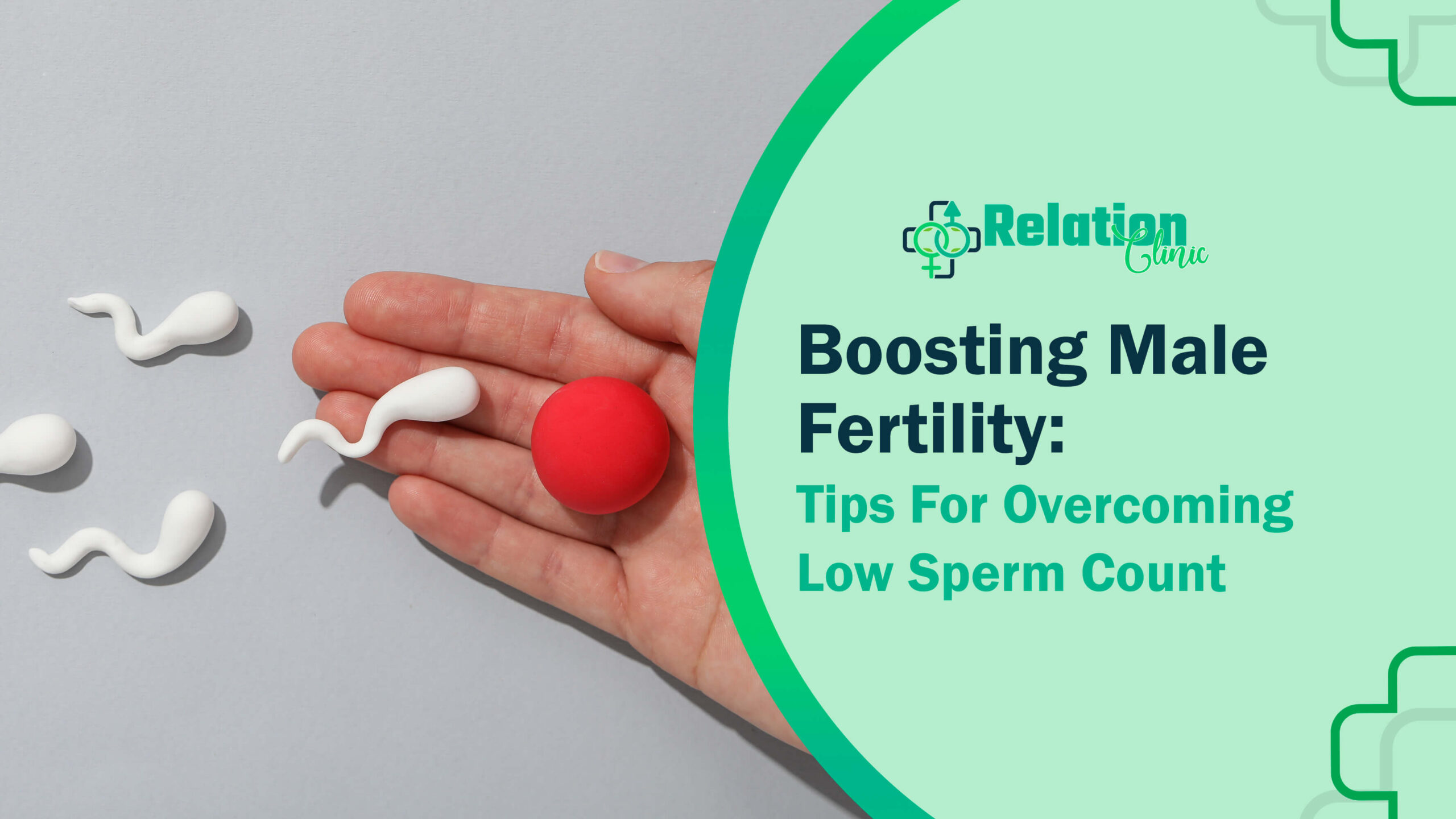INTRODUCTION
Low sperm count, also known as oligospermia, can be a source of stress and concern for couples trying to conceive. It is a condition in which a man has a lower-than-normal number of sperm in his semen. A normal sperm count is considered to be at least 15 million sperm per milliliter of semen, but a count of less than 5 million sperm per milliliter is considered low.
However, there are several steps men can take to boost their sperm count and improve their fertility. In this blog, we’ll discuss the primary causes of low sperm count and explore some effective tips for overcoming low sperm count and increasing your chances of starting a family.
Causes Of Low Sperm Count

Low sperm count can be caused by a variety of factors, from lifestyle choices to medical conditions. So, understanding the causes of low sperm count is crucial in developing effective treatment strategies.
Here are some of the following major causes of low sperm count that can affect the fertility of a man:
1. Poor Lifestyle Habits
Lifestyle factors play a significant role in sperm count and quality. Habits such as smoking, excessive alcohol consumption, and a sedentary lifestyle can have a negative impact on sperm count and motility. Obesity, a known risk factor for infertility, has been shown to have a negative effect on sperm count, as well as hormonal imbalances that can impact sperm production.
2. Environmental Issues
Environmental factors such as exposure to toxins and chemicals can also contribute to low sperm count. Many common chemicals found in the environment, such as pesticides and heavy metals, can disrupt the endocrine system and impact sperm production. Additionally, prolonged exposure to heat, such as from hot tubs or laptops, can also raise the temperature of the testes and impact sperm count.
3. Injury or Poor Health Condition
Medical conditions such as testicular injury, infections, hormonal imbalances, and genetic disorders can also contribute to low sperm count. For example, conditions like varicoceles, a condition where the veins in the testicles become enlarged and can lead to decreased sperm production, can be treated through surgery. Additionally, some infections, such as chlamydia and gonorrhea, can cause scarring in the reproductive system and reduce sperm count.
4. Drugs & Medications
Certain medications can also impact sperm count, including testosterone replacement therapy and anabolic steroids. These medications can interfere with the delicate balance of hormones necessary for healthy sperm production and reduce sperm count. It’s important to discuss with your doctor any medications you’re taking and their potential impact on fertility before attempting to conceive.
5. Poor Diet & Stress
Stress and poor nutrition can also play a role in low sperm count. Chronic stress can disrupt the endocrine system and reduce testosterone production, while poor nutrition can lead to deficiencies in essential vitamins and minerals necessary for healthy sperm production.
6. Aging
Finally, age is another factor that can impact sperm count and quality. As men age, their sperm count tends to decrease, and their sperm can become less motile, making it more difficult to conceive.
Tips to Overcome Low Sperm Count Naturally
While the cause of low sperm count can range from lifestyle factors to medical conditions, there are several steps men can take to boost their sperm count and improve their fertility.
Here are 10 tips for overcoming low sperm count naturally:
- Improve Diet: A balanced diet that includes plenty of fruits, vegetables, and lean protein can provide the nutrients necessary for healthy sperm production. Focus on foods that are high in antioxidants, such as berries, and those that contain essential vitamins and minerals, like vitamin C, selenium, and zinc.
- Reduce Stress: Chronic stress can disrupt the endocrine system and reduce testosterone production, so it’s important to find ways to manage stress. Activities like yoga, meditation, and exercise can help reduce stress and improve overall health.
- Quit Smoking: Smoking can reduce sperm count and motility and increase the risk of sperm abnormalities. Quitting smoking is an essential step in improving fertility and overall health.
- Limit Alcohol Consumption: Excessive alcohol consumption has been linked to low sperm count and decreased testosterone production. Limiting alcohol consumption can help improve sperm count and overall health.
- Maintain a Healthy Weight: Obesity can impact sperm count and fertility, so maintaining a healthy weight is important. Regular exercise and a balanced diet can help achieve and maintain a healthy weight.
- Avoid Heat Exposure: Excessive heat exposure, such as from hot tubs or laptops, can raise the temperature of the testes and impact sperm count. Avoiding prolonged exposure to heat can help improve sperm count.
- Take Supplements: Certain supplements, such as vitamin C and antioxidants, have been shown to improve sperm count and motility. However, it’s essential to consult with a doctor before starting any supplements, as some can have harmful interactions with medications or medical conditions.
- Get Enough Sleep: Lack of sleep can disrupt hormone levels and reduce testosterone production, so it’s essential to get enough quality sleep. Aim for 7-9 hours of sleep per night to improve overall health and fertility.
- Seek Medical Treatment: For conditions like hormonal imbalances or infections, medical treatment may be necessary to improve sperm count. Consult with a doctor to determine the best course of treatment for your specific situation.
- Practice Healthy Sexual Habits: Sexual habits such as frequent ejaculation or using lubricants can impact sperm count. Practicing healthy sexual habits, such as limiting the frequency of ejaculation and avoiding lubricants that can harm sperm, can help improve sperm count.
Some Medical Treatments to Increase Sperm Count
The treatment for low sperm count depends on the underlying cause. Some common treatments include:
- Medical Treatment: Hormonal imbalances or infections can be treated with medication.
- Surgery: For conditions like varicoceles, surgery can help improve blood flow and reduce pressure on the testicles, leading to increased sperm production.
- Assisted Reproductive Technology (ART): For couples struggling to conceive, ART options such as intrauterine insemination (IUI) or in vitro fertilization (IVF) can be effective treatments.
- Supplements: Certain supplements, such as vitamin C and antioxidants, have been shown to improve sperm count and motility. However, it’s important to consult with a doctor before starting any supplements, as some can have harmful interactions with medications or medical conditions.
If you are facing severe issues due to low sperm count and are willing to choose medical treatments, it’s important to consult with a doctor to determine the best course of treatment for your specific situation. In some cases, a combination of treatments may be necessary to achieve the desired outcome.
To Conclude
In conclusion, low sperm count can be caused by a variety of factors, but making lifestyle changes and seeking medical treatment when necessary can help improve sperm count and increase the chances of starting a family. Remember, it can take several months for changes in lifestyle or medication to impact sperm count, so patience and persistence are key in overcoming low sperm count.
If you are struggling with low sperm count and looking for expert care and support, consider seeking treatment at Relation Clinic. We offer comprehensive treatment options for low sperm count. The clinic uses a multi-disciplinary approach to diagnose and treat the underlying cause of the low sperm count. Relation Clinic offer other sex related services like Vaginal Discharge Treatment, Treatment For Loss Of Libido etc.
For more information, please visi the website.
Website:- https://relationclinic.com/You can also contact us through mail on info@relationclinic.com
Or can also call us on +91 – 9831072167

